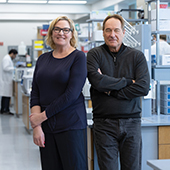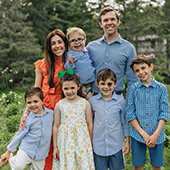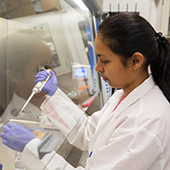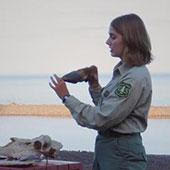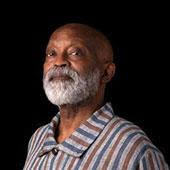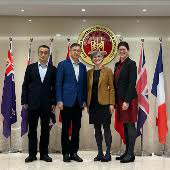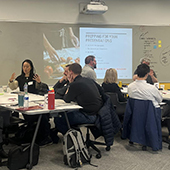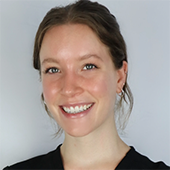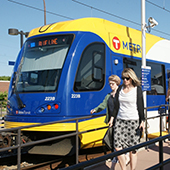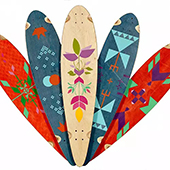- Features: What if we could “cure” aging?; After dual cancer diagnosis, Michael has a successful kidney transplant; Innovations for oak wilt detection and containment.
- Awards and Recognition: U of M becomes nation’s first to receive community engagement distinction for every campus; and more.
What if we could ‘cure’ aging?
Partners in life as well as work, biochemist and physician Laura Niedernhofer and molecular biologist Paul Robbins oversee the U of M's Institute on the Biology of Aging and Metabolism. Internationally recognized experts in the quest to slow and even prevent the debilitating diseases of old age—including cancer, diabetes, heart disease, and dementia—Niedernhofer and Robbins hope to eventually treat old age itself.
After dual cancer diagnosis, Michael has a successful kidney transplant
Four-year-old Michael Borg received a kidney from his father in September. The organ transplant was the latest step in a medical journey at M Health Fairview Masonic Children’s Hospital that began before Michael was born. Now the family hopes a healthier future is on the horizon.
Innovations for oak wilt detection and containment
Oak wilt is a deadly fungus that threatens Minnesota's oak forests and urban trees. Once infected, there is no cure, but University of Minnesota researchers have developed new tools that help detect the disease.
Awards and Recognition
U of M becomes nation’s first to receive community engagement distinction for every campus; Minnesota Partnership for Biotechnology and Medical Genomics awards five collaborative research grants; 2023 Academies for Excellence inductees; Center for Animal Health and Food Safety receives $4.99 million award for veterinary services capacity-building in East Africa; the School of Public Health is one of 24 recipients that collectively have received nearly $16 million from the EPA in pollution-prevention grants; Joanne Billings has been named as the new associate vice president for research integrity and compliance; U in the News features highlights of University faculty and staff cited in the media.
Coursera offerings available free for U of M faculty, staff, and students
All University of Minnesota students, faculty, and staff have free access to a range of courses and specializations in Coursera. Access U of M Coursera content through Coursera for Minnesota, as well as over 3,800 online courses and 400 specializations from other institutions through the Coursera for Minnesota Consortium. Use your U of M credentials to log in. Email Fritz Vandover at [email protected] with any questions about accessing Coursera content or, for faculty, utilizing it in your U of M courses.
Now Live: Minnesota Earned Sick and Safe Time
Now in effect, the University provides employees working in Minnesota, including student workers, paid time through the Minnesota Earned Sick and Safe Time (ESST) program. Separate from current sick time programs, ESST is additional time employees can use when they are sick, to care for a sick family member, to seek assistance if an employee or their family member has experienced domestic abuse, or if there is a work, school, or childcare closure. Employees can earn up to 48 ESST hours a year and can view their banked time in MyU.
Upcoming VPN client change
To maintain security standards, University IT will be changing the VPN (virtual private network) client systemwide from Cisco AnyConnect Secure Mobility Client to Cisco Secure Client on Jan. 23. Though users will notice some changes in the interface’s appearance, the functionality will remain the same. There are two ways that users will experience the VPN client upgrade: automatic (upon start-up) or in-line (upon login to Cisco). Learn more about the VPN upgrade.
New ‘Home’ page available in Google Drive
A new homepage for Google Drive, called “Home,” is available. Home makes it easier and faster to find files and collaborate. Note that it may take up to two weeks for the Home page to appear for all University Google Workspace accounts. Learn about the new features available, including how to set your default landing page.
MITPPC request for proposals for new invasive species research projects
The Minnesota Invasive Terrestrial Plants and Pests Center (MITPPC) is accepting proposals for new research projects on priority terrestrial invasive species in Minnesota. $3.75 million is available for grants up to $150,000 per year for four years. Applications are due by Apr. 30. U of M faculty, staff, and postdocs are eligible to apply for funding as principal investigators. Learn more and apply.
Stronger TIES, better schools
Students with extensive support needs learn best in inclusive classrooms, but general education teachers often struggle to reach them. Institute on Community Integration TIES Center researchers are working with several large U.S. school districts to boost the quality and quantity of learning time spent in inclusive classrooms among students with extensive support needs. Their aim: Enhancing students’ lifelong choices and outcomes.
Research Brief: Sharing with humans squeezes wildlife into the temporal periphery
As human densities increase around the world, wildlife species are becoming more nocturnal to compensate. These adaptations allow wildlife to live in human-altered habitats, but may result in unseen costs. Researchers in the U of M College of Biological Sciences conducted a case study to better understand the impact of human activities on wildlife. See additional recent Research Briefs.
Talking snow shovel design with U of M
With Minnesota winters, there is perhaps no tool more important than the snow shovel. Gabriel Ruegg, a senior lecturer of product design in the College of Design, answers questions about how to make sure you select a quality shovel this winter. See more editions of "Talking with U of M."
Pedagogical Innovations Journal Club via Zoom
Spring 2024 Pedagogical Innovations Journal Club discussions of educational research articles will feature the influence of gendered language on women's achievements in STEM (Jan. 18), the role of trust in faculty for marginalized students (Feb. 15), the effectiveness of role model interventions for women in STEM (March 20), and the unique challenges faced by rural students in higher education (Apr. 18).
Jan. 24 - Mini-Webinar: Technology Commercialization 101
Learn how to move your research from the academic setting out into the world in this overview of the Tech Comm office and how it helps researchers commercialize their innovations. This event was designed with researchers who are new to technology commercialization in mind, but it is open to anyone.
Register for ‘Reimagining Retirement’ webinar series
The University of Minnesota Retirees Association will host "Reimagining Retirement: Exploring Your Life Plan," a three-part series developed especially for higher education retirees and prospective retirees. Events take place Jan. 30, Feb. 13, and Feb. 27, noon-1:30 p.m. via Zoom.
March 7 - Rare Disease Day
"Orphan Products for Rare Diseases: Availability and Accessibility—They're Not the Same Thing" will feature a patient advocacy group breakfast, a poster symposium, and keynote addresses from David Fajgenbaum, co-founder and president of Every Cure, and Dave McLean, chief executive officer of Emerging Therapy Solutions. Virtually or in person at McNamara Alumni Center. Register for Rare Disease Day and learn more.
U of M Crookston earns NCAA Presidents' Award for Academic Excellence
U of M Crookston is one of three Northern Sun Intercollegiate Conference schools to earn the Presidents' Award for Academic Excellence from the NCAA. The Golden Eagles posted an academic success rate of 90 percent. For the second consecutive year, 44 member schools have earned this honor, including three from the NSIC: Augustana University, Concordia-St. Paul, and U of M Crookston.
Crookston campus earns Carnegie Elective Classification for Community Engagement
U of M Crookston's application focused on its commitment to community partnerships related to economic development. "The Carnegie classification is quite an honor to achieve. It is a strong testament to the active and engaged university community that is involved in the community and region," says Chancellor Mary Holz-Clause.
Finding community and purpose in outdoor education
Elizabeth Ross is an environmental and outdoor education major at the College of Education and Human Service Professions at UMD. When school’s not in session, she’s worked summers as a seasonal ranger with the National Forest Service in northern Minnesota. Read more about her journey and how her work earned her a National Park Service STAR award.
Jan. 23 - VCLS to host Seitu Ken Jones, multidisciplinary artist
The Visual Culture Lecture Series (VCLS) is hosting Multidisciplinary Artist Seitu Ken Jones at 6 p.m., Solon Campus Center. Working between the arts and public spheres, Jones channels the spirit of radical social movements into experiences that foster critical conversations and nurture more just and vibrant communities from the soil up. He is recognized as a dynamic collaborator and a creative force for civic engagement.
Ericksen participates in international symposium
U of M Morris Chancellor Janet Schrunk Ericksen traveled to Sanya, China, in December to participate in the 2024 SEP EduConnect International Symposium, hosted by the China Center for International People-to-People Exchange.
New year, new name
U of M Morris Student Activities, Conferences and Events will now be known as Student Engagement & Events (SEE). The core programs and services are not changing. This new name better recognizes the importance of Morris students finding and building community as a core part of their student experience.
New designs for a new era
Paul Hanstedt, vice chancellor for academic affairs and innovation, and faculty from UMR’s Center for Learning Innovation facilitated a collaborative faculty dialogue among curriculum innovators from The Hormel Institute, Mayo Clinic, and the U of M Twin Cities. As UMR continues to craft new program designs for a new era of higher education, its commitment to students is the motivation for hosting conversations that tap into the collective genius.
Health Care Research and Discovery Pathway
Discover how Elisabeth Pearson navigated her time at UMR to prepare her for medical school applications and her current role as a medical assistant at a dermatology clinic. UMR's innovative degree programs and integrated curriculum provide students with a foundational health sciences education into six distinct Health Career Pathways. Learn more about UMR’s Health Care Research and Discovery Pathway.
University of Minnesota stormwater pollution prevention survey
If you have input regarding the University of Minnesota Twin Cities' Stormwater Pollution Prevention Program, submit your feedback using this public comment form, open year-round. Learn more about the U of M stormwater program.
Blue Line Extension work group recommends anti-displacement strategies
Hennepin County and the Metropolitan Council started a first-of-its-kind, community-oriented anti-displacement initiative to ensure current residents and businesses share in the benefits of the Blue Line Extension. As part of the initiative, project partners worked with the U of M’s Center for Urban and Regional Affairs to convene a work group to study and recommend anti-displacement strategies.
Lessons in chemistry and advocacy
Adam Langenfeld studied medicine at the U of M. When his baby was born prematurely, it helped solidify his interest in working with children with neurodevelopmental differences. Langenfeld, a former fellow of the Minnesota Leadership Education in Neurodevelopmental and Related Disabilities (MNLEND) program, is now a developmental pediatrician at Children’s Minnesota.
Jan. 29 and Feb. 6 - National Center for Faculty Development and Diversity (NCFDD) workshops
The Office for Equity and Diversity's Institute for Diversity, Equity, and Advocacy and the Office for Faculty and Academic Affairs are hosting free, in-person NCFDD workshops. These workshops, titled “Mentoring 101: How to Get What You Need to Thrive in the Academy”and “Building a Publishing Pipeline: Concrete Strategies for Increasing Your Writing Productivity,” are open to all faculty, grad students, and postdocs.
Teaching with Writing spring series
For the spring semester, the Teaching With Writing Series will explore capstone writing assignments, team writing, and how generative AIs are changing writing processes and practices. Faculty members, instructors, and graduate students are invited to register for workshops, lunchtime panels, and a book circle. No charge, but pre-registration is required.
Featured events
Ongoing - Dreaming Our Futures: Ojibwe and Očhéthi Šakówiŋ Artists and Knowledge Keepers
Jan. 18 - Justice in Public Health: Abolition for Public Health
Jan. 19 - Health Benefits Workshop for New Employees
Jan. 19 - Dance Roots book reading with Mary Moore Easter
Jan. 22 - Mindful Mondays: Free Drop-In Sessions
Jan. 25 - Northrop Presents: Hubbard Street Dance Chicago
Jan. 31 - A Feast of Words: Featuring Keith Mayes
Jan. 31 - Free Webinar: Introduction to Human-Centered Design
